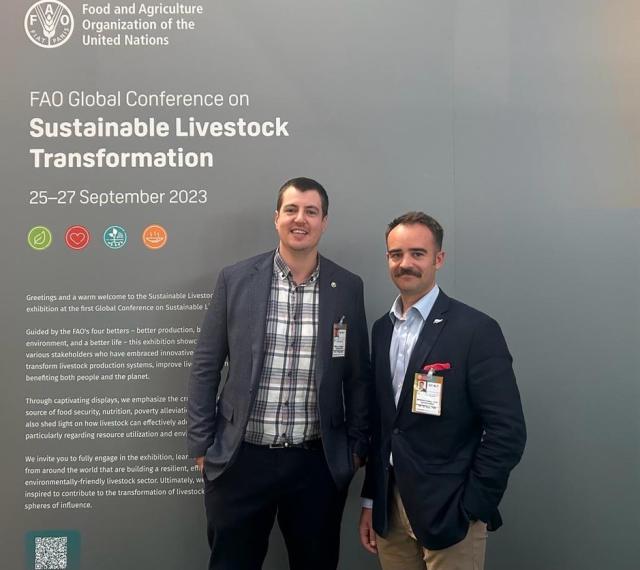B+LNZ's UK and EU Regional Manager Alex Gowen attended the recent UN FAO Global Conference on Sustainable Livestock and launch of a new report on methane in livestock systems, as part of our ongoing international advocacy.

The United Nations Food and Agriculture Organisation (UN FAO) hosted the first ever Global Conference on Sustainable Livestock Transformation at the FAO Headquarters in Rome at the end of September.
Alex represented New Zealand’s beef and sheep farmers as part of the International Meat Secretariat (IMS), a broad organisation representing the global meat industry, which B+LNZ plays an active role in. Federated Farmers were also present with one of their staff currently based in Europe attending through the World Farmers Organisation.
Attending the conference provided an opportunity for B+LNZ to meet with other likeminded organisations and help build understanding of the importance of using the latest science regarding methane emissions and the GWP* metric.
There was particular focus on approaches to holistic sustainability in order to achieve the UN’s Sustainable Development Goals (SDGs) under the four ‘betters’ framework: better production, better nutrition, better environment and a better life. Sustainable livestock systems play important roles in achieving each of these aspirations and this was reiterated by a diverse line-up of international speakers.
New methane report
The conference saw the launch of the ‘Methane emissions in livestock and rice systems – Sources, Quantification, Mitigation and Metrics’ report.
The report was prepared by the technical advisory group on methane (Methane TAG) of the FAO Livestock Environmental Assessment and Performance Partnership (FAO LEAP Partnership). NZ academics and researchers from AgResearch, Maanaki Whenua – Landcare Research, and MPI contributed to the review process. Also involved was Michelle Cain, Cranfield University, who was one of the authors of the joint research commissioned by B+LNZ/Federated Farmers/DairyNZ on NZ’s methane targets.
The methane report will be of significant interest to red meat producers and government policy makers in NZ as it represents a global synthesis of academic opinion from the UN as an authority on global agricultural development.
The report underscores the relevance of addressing methane emissions on a global scale, despite its relatively short atmospheric lifetime compared to carbon dioxide. It is divided into four key sections:
- Understanding methane sources and sinks: The report emphasises that methane's impact metrics depend on the timeframe considered, unlike long-lived greenhouse gases like carbon dioxide or nitrous oxide.
- Quantification of methane emissions: The report delves into the methods and methodologies used to measure and estimate methane emissions from sources such as ruminant animals and manure. It highlights the importance of standardised reporting and sensitivity testing of climate change impact assessments using various metrics.
- Mitigation strategies: A central focus is on strategies to mitigate methane emissions, with particular attention to enteric methane from ruminant production. Various approaches, including dietary manipulation, rumen management, and low methane-producing animal selection, are discussed. The report acknowledges the need for further research, especially for extensive production systems.
- Metrics for impact quantification: The final section addresses the metrics used to quantify the impact of methane emissions and mitigation efforts. It highlights the use of metrics like Global Warming Potential (GWP) and Global Temperature Potential (GTP) over specified time horizons, noting that the choice of metric depends on policy objectives and desired climate impacts.
The report recommends that countries report on individual GHGs to ensure clarity and transparency, which is something B+LNZ is encouraging our government to do.
The report discusses the Paris Agreement, differing definitions of climate neutrality and the complexity this introduces, sustainable agriculture and equity considerations, among other issues. These are of crucial importance when applying metrics and making decisions about targets and climate action.
Other points of note from the conference
- Generally most of the countries speaking at the conference were very positive about the importance of the livestock sector to global food security. Countries looking to drive emissions reductions through regulation were in the minority globally, whereas most are looking to use positive incentives to encourage behaviour change.
- A side event demonstrated the large pipeline of tech coming for methane mitigation. It is therefore short-sighted for NZ to afforest productive good farmland when tech solutions are coming.
What does this mean for NZ sheep and beef farmers?
The release of the FAO report supports B+LNZ’s calls for methane to be reported on and managed separately from carbon dioxide. It also recognises that extensive pastoral systems like NZ’s have additional challenges to methane reduction than intensive indoor systems, and therefore a careful approach much be taken to avoid impacting food production.
The report acknowledges that GWP* provides the best approximation of temperature increase over time no matter which gas it relates to and therefore trade-offs can be assessed with respect to their effect on global warming using GWP*.
Ultimately, it concludes that while methane needs to be reduced, the issue needs to be addressed holistically in order to protect food production and nutritional security, livelihoods and economic growth, animal health and welfare.
